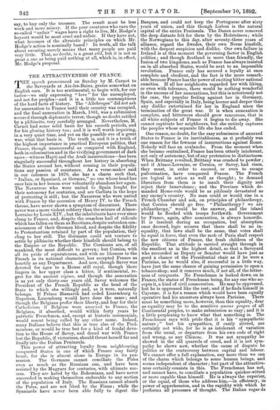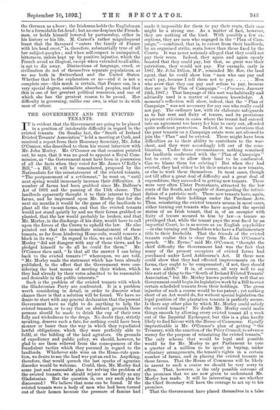THE ATTRACTIVENESS OF FRANCE. T HE speech pronounced on Sunday by
M. Carnot to the Savoyards at Aix-les-Bains, grates somewhat on English ears. It is too sentimental, to begin with, for our tastes—we only expressing " love " for the unemployed, and not for peoples—and it is a little too contemptuous of the hard facts of history. The "Allobroges" did not ask for annexation to France until their country was occupied, and the final annexation in March, 1861, was a submission secured through diplomatic terror, though no doubt ratified by a plebiscite, very carefully arranged. Nevertheless, M. Carnot had some solid basis for his smooth periods, and for his glozing history too ; and it is well worth inquiring, in a very quiet time, and yet on the possible eve of a great war, what that basis is. The truth is, and it is a truth of the highest importance in practical European politics, that France, though unsuccessful as compared with England, both in colonisation and in the vivifying government of dark races—witness Hayti and the Arab insurrections—has been singularly successful throughout her history in absorbing the States around her, without rousing in their popula- tions any passion of resistance. As a verse-maker said in our columns in 1870, she has a charm such that, " Italian, or Spaniard, or German," no one whose head has once lain in her bosom ever voluntarily abandons her again. The Navarrese who were united to Spain fought for their autonomy for centuries, and are Carlists in the hope of protecting it still ; but the Navarrese who were united with France by the accession of Henry IV. to the French throne, have never shown a symptom of discontent. There never was a more violent robbery than the seizure of Alsace- Lorraine by Louis XIV. ; but the inhabitants have ever since clung to France, and, despite the ceaseless hail of ridicule which has fallen on them as Bceotians, despite unbroken con- sciousness of their German blood, and despite the fidelity to Protestantism retained by part of the population, they cling to her still. The Germans could not venture to settle by plebiscite whether their kinsfolk should belong to the Empire or the Republic. The Corsicans are, of all mankind, the most difficult to govern ; but Corsica, with all its pride of separateness, and with no likeness to the French in its national character, has accepted France as heartily as any Department. And now, though Savoy was devoted for ages to a House still royal, though there lingers in her upper class a bitter, if sentimental, re- gret for the ancient regime, and though the annexation is as yet only thirty-one years old, Savoy welcomes the President of the French Republic as the head of the State to which she willingly and, as it were, naturally belongs. If Prince Bismarck had ceded Luxemburg to Napoleon, Luxemburg would have done the same ; and though the Belgians prefer their liberty, and fear for their Catholicism if Belgium were annexed to France, the Belgians, if absorbed, would within forty years be patriotic Frenchmen, and, except at historic ceremonials, would resent being called by any other name. Indeed, many Italians believe that this is true also of the Pied- montese, or would be true but for a kind of feudal devo- tion to the House of Savoy, and dread war with France lest the Republic, if victorious, should thrust herself far and finally into the Italian Peninsula. This power of attracting loyalty from neighbouring conquered States is one of which France may fairly boast, for she is almost alone in Europe in its pos- session. The Germans cannot conciliate the Poles even as much as the Russians can, and have been resisted by the Magyars for centuries, with ultimate suc- cess. They are hated by the Bohemians, and have never succeeded in making themselves endurable to any section of the population of Italy. The Russians cannot absorb the Poles, and are not liked by the Finns ; while the Spaniards have never been able fully to digest the Basques, and could not keep the Portuguese after sixty years of union, and this though Lisbon is the natural capital of the entire Peninsula. The Danes never removed the deep distaste felt for them by the Holsteiners ; while the Norwegians to this day, after seventy-three years of alliance, regard the Swedes, their own Norse kinsfolk, with the deepest suspicion and dislike. Our own failure in Ireland is at this moment the governing factor in English politics ; and though Scotland is more than friendly, the fusion of two kingdoms, such as France has always insisted on in all absorbed States, would be next to an impossible revolution. France only has secured a loyalty at once complete and obedient, and the fact is the more remark- able because France has the power of exciting bitter national enmities. If all her neighbours regarded her with liking, or even with tolerance, there would be nothing wonderful in the success of her annexations, but this is notoriously not the case, the popular feeling against her in Germany, Spain, and especially in Italy, being keener and deeper than any dislike entertained for her in England since the termination of the great war. It is when annexation is complete, and bitterness should grow rancorous, that in all white subjects of France it begins to die away. She cannot captivate her neighbours, but she entirely captures the peoples whose separate life she has ended.
One reason, no doubt, for the easy submission of annexed States to France is its inevitableness, as it probably was one reason for the fewness of insurrections against Rome. Nobody will face an avalanche. From the moment when she became centralised, France has been utterly intolerant, not only of autonomy, but of any pretension to distinctness. When Brittany revolted, Brittany was crushed to powder ; and if Alsace-Lorraine, or Corsica, or Savoy, had risen, they must, in order to succeed, or even to escape pulverisation, have conquered France. The French are logical in action as well as thought ; to demand liberation from them is to insult their dignity and reject their benevolence ; and the Province which de- manded Home-rule would be as pitilessly devastated as any enemy's country. No man could or would rise in a French Chamber and ask, on principles of philanthropy, that Corsica, should go free. " Philanthropy ? we are philanthropy," would be the answer, and the island would be flooded with troops forthwith. Government by France, again, after annexation, is always honorific. It is insolent during an occupation, but absorption once decreed, logic secures that there shall be no in- equality, that laws shall be the same, that votes shall be equal in force, that even the mob of Paris shall respect the new citizens of France, the fresh children of the Republic. That attitude is carried straight through in the smallest as in the highest detail, so that a Savoyard who succeeded as Deputy or Senator would have just as good a chance of the Presidential chair as if he were a Parisian, as he would also, if successful in a little way, have just the same chance of gaining permission to open a tobacco shop; and it removes much, if not all, of the bitter- ness of conquests. No Frenchman is looked down on in France, the status of Frenchman being, for any one who ac- cepts it, a kind of civil consecration. He may be oppressed, but he is oppressed like the rest; and if he finds himself in Cayenne, it is for a reason which would have been equally operative had his ancestors always been Parisian. There must be something more, however, than this equality, dear as equality may be to the sensitive amour propre of all Continental peoples, to make submission so easy ; and it is a little perplexing to know what that something is. The Frenchman says with pride that it is his " sympathetic nature ; " but his sympathies, if easily stirred, are certainly not wide, for he is as intolerant of variation from the usual, or departure from his own code of right and wrong, as any Chinese. It was not sympathy he showed in the old quarrels of creed, and it is not sym- pathy he shows now, whether the cause of dispute be politics or the controversy between capital and labour. We cannot offer a full explanation, any more than we can of the charm which belongs to some human beings, and seems independent of character ; but part of the attractive- ness certainly consists in this. The Frenchman has not, and cannot have, to conciliate a population quicker-witted or more capable than himself. He is always the superior, or the equal, of those who address him,—in efficiency, in power of apprehension, and in the rapidity with which he performs all processes of thought. The Italian regards the German as a boor ; the Irishman holds the Englishman to be a formidable fat-head ; but no one despises the French- man, or holds himself lowered by partnership, either in his history or his life. M. Carnot's rather magniloquent boast that the Savoyard " enters the family of France with his head erect," is, therefore, substantially true of all her subject-peoples ; and when self-respect is unimpaired, bitterness, unless kept up by positive injustice, which the French avoid as illogical, except when extended to all alike, is apt to die away. Distinctions of language, creed, or civilisation do not of themselves separate populations, as we see both in Switzerland and the United States. Whether that be the explanation or no—and it is not a complete one—this much is certain, that France can, in a very special degree, assimilate absorbed peoples, and that this is one of her greatest political resources, and one of which she has the greatest reason to be proud. Her difficulty in governing, unlike our own, is what to do with men of colour.



































 Previous page
Previous page